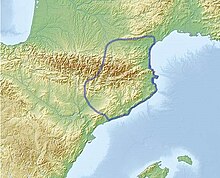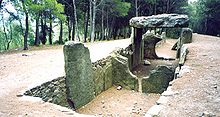 | |
| Geographical range | Northern Catalonia, Pyrénées-Orientales, Aude |
|---|---|
| Period | Chalcolithic |
| Dates | c. 3500–2000 BC |
| Type site | Véraza (Aude, France) |
| Preceded by | Sepulcres de fossa culture and Chasséen culture |
| Followed by | Bell Beaker culture |
| Defined by | Jean Guilaine |

The Veraza Culture was a Chalcolithic culture that extended over the half north of Catalonia and the southern French departments of Aude and Pyrénées-Orientales, in a period between 3500 and 2000 BC. [1] [2] [3] [4] [5] [6]
Dwellings
The hamlets were usually in plains, without defensive structures (Camp del Rector, La Prunera). The huts were aerial, as postholes were used to keep the structure, other huts had instead a stone basement (Ca n'Isach, El Coll), and even others were partially excavated on the ground (Can Vinyals). [7]
Artifacts
Clothing was advanced as a spindle whorl used to create textiles was found in Bòbila Madurell site (Sant Quirze del Vallès, Barcelona province). Metallurgy was used and some beads made of gold and copper are known. [8]
Burials

The Veraza people were responsible for erecting many of the megalithic monuments in the region where they were settled, as was the case with the dolmen Lo Morrel dos Fados, Pépieux (Aude). [9]
Other burials known from the Véraza culture were caves (Cova del Frare, Cau de la Guineu), artificial caves with megalithic entrance known as paradolmens (Rec de la Quarentena, Costa de Can Martorell), collective pits, and hypogea.
Menhirs were erected like those of Mollet, Sitja del Llop or Ca l'Estrada. [10]
Genetic profile
Individuals buried in paradolmens of La Clape massif near Narbonne (Grotte du Rouquet and Grotte des Tortues), and dated to the last third of the IV millennium (Véraza period) were geneticaly tested: all males had Y-chromosome haplogroup I-M438, being four males assigned to the subclade I2a1b1b1, and the other to I2a1a2. The autosomal components were 3/4 Ancient Neolithic Farmer, 1/4 Western Hunter-Gatherer. [11] In the southernmost geographic range of the Véraza culture, 13 individuals found in the paradolmen Cova de la Guineu [12] (Font-Rubí, Barcelona) were tested, the Y-DNA results of the individuals with enough genetic coverage were: 2 x I, 1 x I2, 1 x I2a2a, 2 x G2a (G2a2a1a3 and G2a2b2b1a1). [13] The remains of three individuals buried in the dolmen des Fades (or Morrel dos Fados) were tested, the Y-DNA of the male individual was assigned to the subclade I2a1a1a1. [14]
References
- ^ Cólliga, Araceli Martín. "El grupo de Veraza en Cataluña-1977". MARTIN, A. (1977): El grupo de Veraza en Cataluña, XIV Congreso Nacional de Arqueología. Vitoria, 1975: 341-354.
- ^ Tarrús i Galter, Josep (1985). "Consideracions sobre el Neolític final - calcolític a Catalunya (2500-1800 a.C.)". Cypsela: Revista de prehistòria i protohistòria. 5: 47–57.
- ^ Guilaine, Jean (1980). Le Groupe de Véraza et la fin des temps néolithiques: dans le sud de la France et la Catalogne. Paris: Éditions du C.N.R.S. ISBN 2222027160.
- ^ Willing, Matthias (2011). "Die Véraza-Kultur: Eine «vergessene» Megalithkultur in Südfrankreich". Antike Welt. 1: 42.
- ^ Araceli, Martín Cólliga (1976). "El grupo de Veraza en el Berguedá". Cypsela. 1: 69–73.
- ^ Martín Cólliga, Araceli (11 January 2003). "Els grups del neolític final, calcolític i bronze antic : Els inicis de la metal·lúrgia". Cota zero: Revista d'arqueologia i ciència. 18: 76–105. ISSN 2385-3190.
- ^ Martín Cólliga, Araceli (2003). "Els grups del neolític final, calcolític i bronze antic. Els inicis de la metal.lúrgia". Cota Zero. 18: 76–105.
- ^ Martín Cólliga, Araceli (2003). "Els grups del neolític final, calcolític i bronze antic. Els inicis de la metal.lúrgia". Cota Zero. 18: 76–105.
- ^ ""Culture de Ferrières et culture de Véraza"". brunophotodoc.pagesperso-orange.fr.
- ^ Moya i Garra, Andreu; Martínez Rodríguez, Pablo; López Melción, Joan B. (2010). "Éssers de pedra. Les estàtues-menhirs i esteles antropomorfes de l'art megalític de Catalunya". Cypsela. 18: 11–41.
- ^ Seguin-Orlando, Andaine; Donat, Richard; Der Sarkissian, Clio; Southon, John; Thèves, Catherine; Manen, Claire; Tchérémissinoff, Yaramila; Crubézy, Eric; Shapiro, Beth; Deleuze, Jean-François; Dalén, Love; Guilaine, Jean; Orlando, Ludovic (March 2021). "Heterogeneous Hunter-Gatherer and Steppe-Related Ancestries in Late Neolithic and Bell Beaker Genomes from Present-Day France". Current Biology. 31 (5): 1072–1083.e10. doi: 10.1016/j.cub.2020.12.015. PMID 33434506.
- ^ Oms, F. Xavier; Mestres, Josep; Cebrià, Artur; Morales, Juan I.; Mendiela, Susana; Pedro, Mireia (2018). "Primers resultats sobre la seqüència del neolític final al bronze final c. 3350-900 cal. aC a la Cova de la Guineu (Font-rubí, Alt Penedès, Barcelona)". Tribuna d'Arqueologia. 2014–2015: 254–266. hdl: 2445/168545.
- ^ Olalde, Iñigo; Mallick, Swapan; Patterson, Nick; Rohland, Nadin; Villalba-Mouco, Vanessa; Silva, Marina; Dulias, Katharina; Edwards, Ceiridwen J.; Gandini, Francesca; Pala, Maria; Soares, Pedro; Ferrando-Bernal, Manuel; Adamski, Nicole; Broomandkhoshbacht, Nasreen; Cheronet, Olivia; Culleton, Brendan J.; Fernandes, Daniel; Lawson, Ann Marie; Mah, Matthew; Oppenheimer, Jonas; Stewardson, Kristin; Zhang, Zhao; Jiménez Arenas, Juan Manuel; Toro Moyano, Isidro Jorge; Salazar-García, Domingo C.; Castanyer, Pere; Santos, Marta; Tremoleda, Joaquim; Lozano, Marina; García Borja, Pablo; Fernández-Eraso, Javier; Mujika-Alustiza, José Antonio; Barroso, Cecilio; Bermúdez, Francisco J.; Viguera Mínguez, Enrique; Burch, Josep; Coromina, Neus; Vivó, David; Cebrià, Artur; Fullola, Josep Maria; García-Puchol, Oreto; Morales, Juan Ignacio; Oms, F. Xavier; Majó, Tona; Vergès, Josep Maria; Díaz-Carvajal, Antònia; Ollich-Castanyer, Imma; López-Cachero, F. Javier; Silva, Ana Maria; Alonso-Fernández, Carmen; Delibes de Castro, Germán; Jiménez Echevarría, Javier; Moreno-Márquez, Adolfo; Pascual Berlanga, Guillermo; Ramos-García, Pablo; Ramos-Muñoz, José; Vijande Vila, Eduardo; Aguilella Arzo, Gustau; Esparza Arroyo, Ángel; Lillios, Katina T.; Mack, Jennifer; Velasco-Vázquez, Javier; Waterman, Anna; Benítez de Lugo Enrich, Luis; Benito Sánchez, María; Agustí, Bibiana; Codina, Ferran; de Prado, Gabriel; Estalrrich, Almudena; Fernández Flores, Álvaro; Finlayson, Clive; Finlayson, Geraldine; Finlayson, Stewart; Giles-Guzmán, Francisco; Rosas, Antonio; Barciela González, Virginia; García Atiénzar, Gabriel; Hernández Pérez, Mauro S.; Llanos, Armando; Carrión Marco, Yolanda; Collado Beneyto, Isabel; López-Serrano, David; Sanz Tormo, Mario; Valera, António C.; Blasco, Concepción; Liesau, Corina; Ríos, Patricia; Daura, Joan; de Pedro Michó, María Jesús; Diez-Castillo, Agustín A.; Flores Fernández, Raúl; Francès Farré, Joan; Garrido-Pena, Rafael; Gonçalves, Victor S.; Guerra-Doce, Elisa; Herrero-Corral, Ana Mercedes; Juan-Cabanilles, Joaquim; López-Reyes, Daniel; McClure, Sarah B.; Merino Pérez, Marta; Oliver Foix, Arturo; Sanz Borràs, Montserrat; Sousa, Ana Catarina; Vidal Encinas, Julio Manuel; Kennett, Douglas J.; Richards, Martin B.; Werner Alt, Kurt; Haak, Wolfgang; Pinhasi, Ron; Lalueza-Fox, Carles; Reich, David (15 March 2019). "The genomic history of the Iberian Peninsula over the past 8000 years". Science. 363 (6432): 1230–1234. Bibcode: 2019Sci...363.1230O. doi: 10.1126/science.aav4040. hdl: 10261/207967. PMID 30872528.
- ^ Arzelier, Ana; Rivollat, Maïté; De Belvalet, Harmony; Pemonge, Marie-Hélène; Binder, Didier; Convertini, Fabien; Duday, Henri; Gandelin, Muriel; Guilaine, Jean; Haak, Wolfgang; Deguilloux, Marie-France; Pruvost, Mélanie (November 2022). "Neolithic genomic data from southern France showcase intensified interactions with hunter-gatherer communities". iScience. 25 (11): 105387. doi: 10.1016/j.isci.2022.105387. hdl: 1854/LU-01GW788FJB6VMD4MDVJA7WT8C0. PMC 9667241. PMID 36405775.